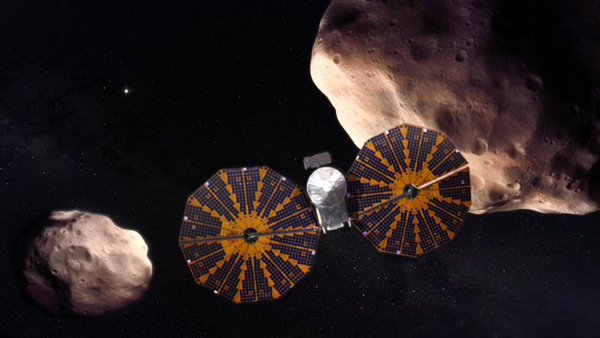
NASA’s Goddard Space Flight Center / Conceptual Image Lab / Adriana Gutierrez
NASA’s Lucy Mission Passes Critical Mission Milestone (News Release)
Last week marked the completion of a major milestone on the path to spacecraft assembly, test, and launch operations for NASA’s Lucy mission.
The Systems Integration Review ensured segments, components, and subsystems, scientific instrumentation, electrical and communication systems, and navigation systems are on schedule to be integrated into the system. It confirmed that facilities, support personnel, and plans and procedures are on schedule to support integration.
The four-day meeting took place from July 27-30. On July 31, the standing review board briefed the team on the results. Due to Covid-19, the review occurred virtually.
In order to keep the team safe during the pandemic, NASA and the partner institutions delayed construction on some of the instruments and components. The Lucy assembly, test and launch operations (ATLO) team developed a new schedule to allow the team to reorder the assembly and testing timeline to give components and subsystems the flexibility they need and still get the spacecraft ready for an on-schedule launch in October 2021.
"No one anticipated that we would be building a spacecraft under these circumstances," said Lucy Principal Investigator, Hal Levison, "but I once again have been impressed by this team's creativity and resiliency to overcome any challenge placed before them."
Successful completion of this System Integration Review means that the project can proceed with assembling and testing the spacecraft in preparations for launch. The spacecraft is on track to begin ATLO next month at the Lockheed Martin Space Systems facilities in Littleton.
Another upcoming milestone is the Key Decision Point-D (KDP-D), which occurs after the project has completed a series of independent reviews that cover the technical health, schedule and cost of the project. Lucy’s KDP-D is currently scheduled for late August of this year.
Lucy will be the first space mission to study the Trojan asteroids, a population of small bodies orbiting the Sun “leading” and “trailing” Jupiter, at the same distance from the Sun as the gas giant. With flyby encounters past eight different asteroids – one in the Main Asteroid Belt and seven in the Trojan swarms, Lucy will be the first space mission in history to explore so many different destinations in independent orbits around our Sun.
Southwest Research Institute in Boulder, Colorado, is the principal investigator institution for Lucy. NASA Goddard Space Flight Center in Greenbelt, Maryland provides overall mission management, systems engineering, and safety and mission assurance. Lockheed Martin Space Systems in Denver is building the spacecraft.
Source: NASA.Gov
****

No comments:
Post a Comment